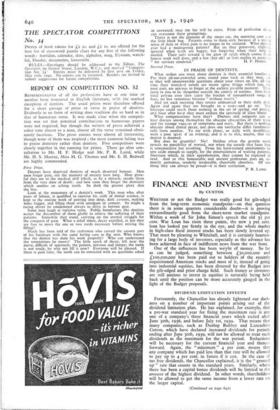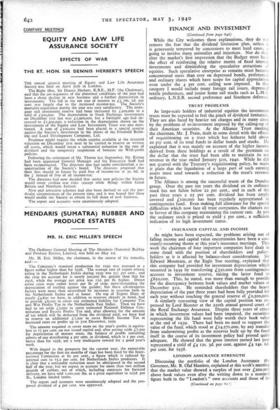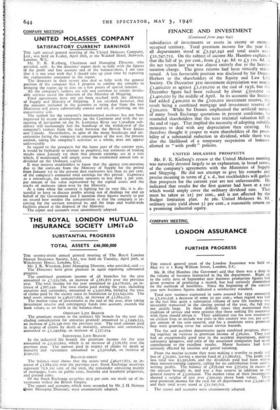FINANCE AND INVESTMENT
By CUSTOS
WHETHER or not the Budget was really good for gilt-edged from the long-term economic standpoint—on that question there is in some quarters considerable doubt—it is proving extraordinarily good from the short-term market standpoint. Within a week of Sir John Simon's speech the old 31 per cent. War Loan has risen three points, the new 3 per, cent. loan has looked par firmly in the eye, and the whole market in high-class fixed interest stocks has been slowly levered up. That must be pleasing to Whitehall, and it is certainly hearten- ing for a large body of investors, especially as the advance has been achieved in face of indifferent news from the war front.
One of the influences has been weiyht of money. So far as can be judged, something between £50,000,000 and Lioo,000,000 has been paid out to holders of the recently requisitioned American stocks and most of it, instead of going into industrial equities, has been diverted by the Budget into the gilt-edged and prior charge field. Such money as investors are still anxious to invest in equities is naturally being held back until the position can be more accurately gauged in the light of the Budget proposals.
DIVIDEND LIMITATION EFFECTS
Fortunately, the Chancellor has already lightened our dark- ness on a number of important points arising out of the dividend limitation plan. He has explained, for example, that a pre-war standard year for fixing the maximum rate is any one of a company's three financial years which ended after June 3oth, 1936, and before July 1st, 1939. That means that many companies, such as Dunlop Rubber and Lancashire Cotton, which have declared increased dividends for periods ending after June 3oth, 1939, will not be allowed to treat such dividends as the maximum for the war period. Reductions will be necessary for the current financial year and thence- forward. Again, the " minimum " 4 per cent. means that any company which has paid less than that rate will be allowed to pay up to 4 per cent. in future if it can. In the case of tax free dividends, the Chancellor explained, it is the "grossed up" rate that counts in the standard years. Similarly, where there has been a capital bonus dividends will be limited to the amount of the highest dividend. In other words, shareholders will be allowed to get the same income from a lower rate on the larger capital.
(Continued on page 642)
FINANCE AND INVESTMENT
(Continued from page 640)
While the City welcomes these explanations, they do not remove the fear that the dividend limitation plan, unless it is generously tempered by concessions to meet hard cases, is going to involve many anomalies and injustices. Nor do they alter the market's first impression that the Budget must have the effect of reinforcing the relative merits of fixed interest investments and diminishing the speculative attractions of equities. Such speculative enterprise as remains must become concentrated more than ever on depressed bonds, preferences and ordinary shares which have scope for capital appreciation even under the 4 per cent ceiling now imposed. In this category I would include many foreign rail issues, depressed textile preferences, and junior home rail stocks such as L.M.S. ordinary, L.N.E.R. second preference and Southern deferred.
TRUST PROBLEMS
As large-scale holders of industrial equities the investment trusts must be expected to feel the pinch of dividend limitation. They are also faced by heavier tax charges and in many cases by the problems of re-investment imposed by the calling-up of their American securities. At the Alliance Trust meeting the chairman, Mr. J. Prain, dealt in some detail with the effects of requisitioning on a trust which has hitherto held about 20 per cent. of its total funds in dollar bonds and stocks. He explained that it was mainly on account of the higher income derived from these holdings as a result of the premium on the dollar that the trust had been able to maintain its net revenue in the year ended January 31st, 1940. While he did not quarrel with the Treasury's requisitioning policy, he made it plain that the liquidation of a large part of such earning assets must tend towards a reduction in the trust's revenue in future.
The Alliance is among the successful trusts of the Dundee group. Over the past ten years the dividend on its ordinary stock has not fallen below 22 per cent., and in each of the past three years a 25 per cent. dividend has been amply covered and Lioo,000 has been regularly appropriated to contingencies fund. Even making.full allowance for the special difficulties which now face all trust companies, the chances are in favour of this company maintaining the current rate. At 500 the ordinary stock is priced to yield 5 per cent., a sufficient indication of its high investment status.
INSURANCE CAPITAL AND INCOME
As might have been expected, the problems arising out of falling income and capital value uncertainties have been a con- stantly-recurring theme at this year's insurance meetings. This week the chairmen of four important companies have dealt in some detail with the position of shareholders and policy- holders as it is affected by balance-sheet considerations. Sir Edward Mountain, at the Eagle Star meeting, explained that this company had provided for investment depreciation which occurred in 1939 by transferring £350,000 from contingencies account to investment reserve, raising the latter fund to £650,000. This, he stated, was more than enough to provide for the discrepancy between book values and market values at December 3rst. He reminded shareholders that the heavy depreciation of the past three years had been fully provided for each year without touching the general reserve of £2,500,000.
A similarly reassuring view of the capital position was ex- pressed by Lord Bicester at the 220th annual general court of the Royal Exchange Assurance. Despite three years of crises in which investment values had been impaired, the securities representing the life fund were fully worth their book value at the end of 1939. There had been no need to support the value of the fund, which stood at £14,571,000, by any transfer from underwriting profits as the reserves built up by the fund itself in the course of its investment policy had proved quite adequate. He showed that the gross interest earned last year represented a yield of £4 us. 3d. per cent. against £4 14s. id. per cent. for 1938.
LONDON ASSURANCE STRENGTH
Discussing the portfolio of the London Assurance the Governor, Mr. R. Olaf Hambro, explained at this week's meeting that the market value showed a surplus of just over £200,000 above book values even after the writing down to a nominal figure both in the " London's " own accounts and those of its (Continued on page 64■)
FINANCE AND INVESTMENT
(Continued from page 64z) subsidiaries of investments or assets in enemy or enerr, occupied territory. Total premium income for the year f., all departments stood at £5,541,542 and total assets were £21,797,712. On the subject of income Mr. Hambro explaine I that the fall of 3s. per cent., from £3 14s. 8d. to £3 ITS. 8d. in the net return last year was almost entirely due to the heayi..r taxation charge. The gross returns had been virtually main- tained. A less favourable position was disclosed by Sir Dennis Herbert to the shareholders of the Equity and Law Lite Society. On December 31St investment depreciation was nearly £1,900,000 as against £1,150,000 at the end of 1938, but th.i December figure had been reduced by about £500,000 to £1,400,000 by the middle of April. In its accounts the Society had added £400,000 to the £100,000 investment reserve, the result being a combined mortgage and investment reserve of £500,000. While Sir Dennis emphasised the artificial nature of many Stock Exchange quotations in present conditions, he reminded shareholders that the next triennial valuation fell at the end of 1940. That implied the necessity of adopting suitable measures to deal with any depreciation then existing. He therefore thought it proper to warn shareholders of the possi- bility of a substantial reduction in dividend, while there was also the likelihood of a temporary suspension of bonuses allotted to "with profit" policies.
UNITED MOLASSES PROSPECTS
Mr. F. K. Idelberg's review at the United Molasses meeting was naturally devoted largely to an explanation, in broad terms, of the company's agreements with the Ministries of Supply and Shipping. He did not attempt to give his remarks any precise meaning in terms of £ s. d., but stockholders will gather that prospects for the current year are not unfavourable. He indicated that results or the first quarter had been at a rate which would amply cover the ordinary dividend rate. That must be taken as 22 per cent., and is not affected by the Budget limitation plan. At 26s. United Molasses 6s. 8d. ordinary units yield about 51 per cent., a reasonable return on a promising industrial equity.




































 Previous page
Previous page